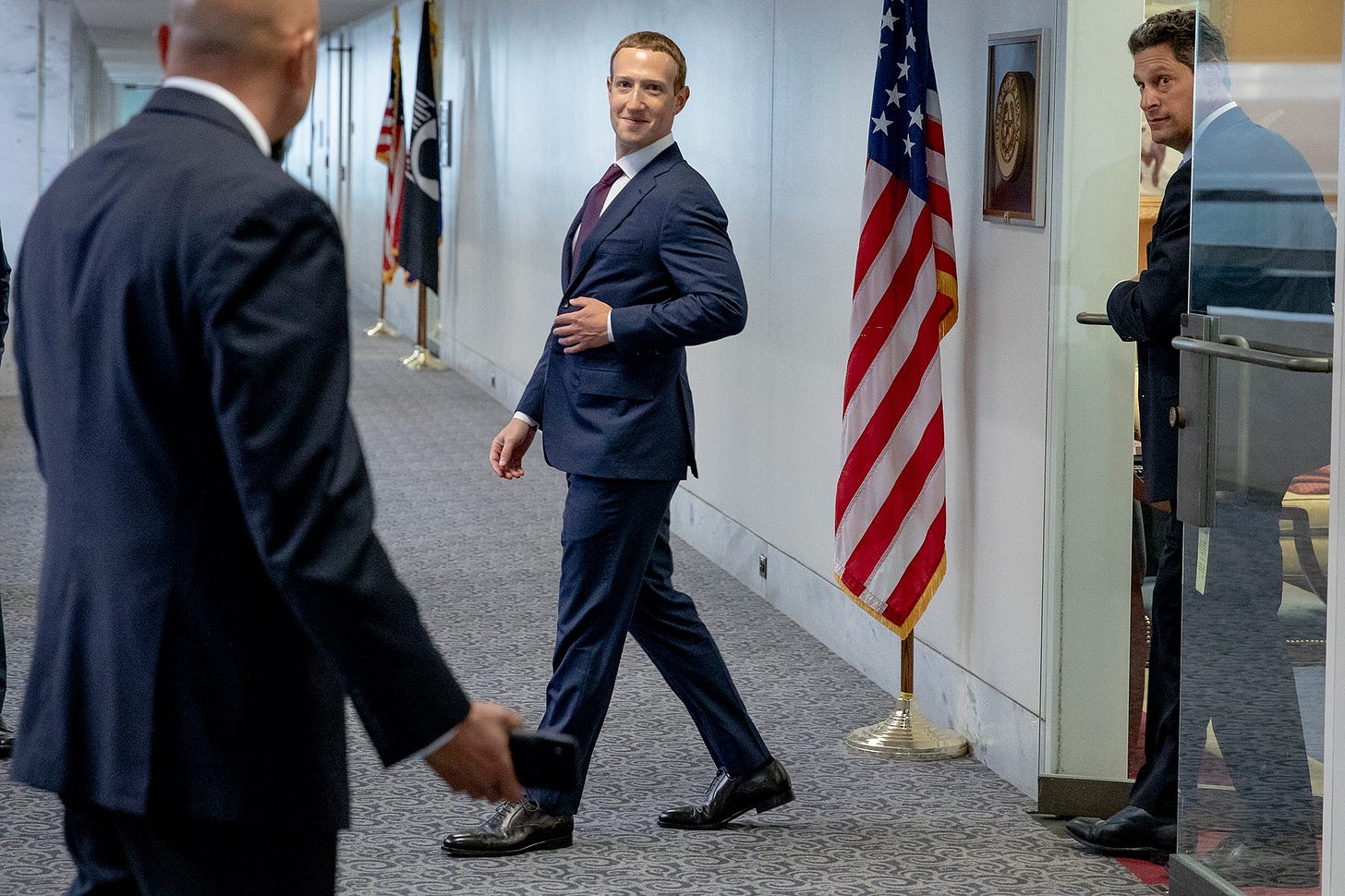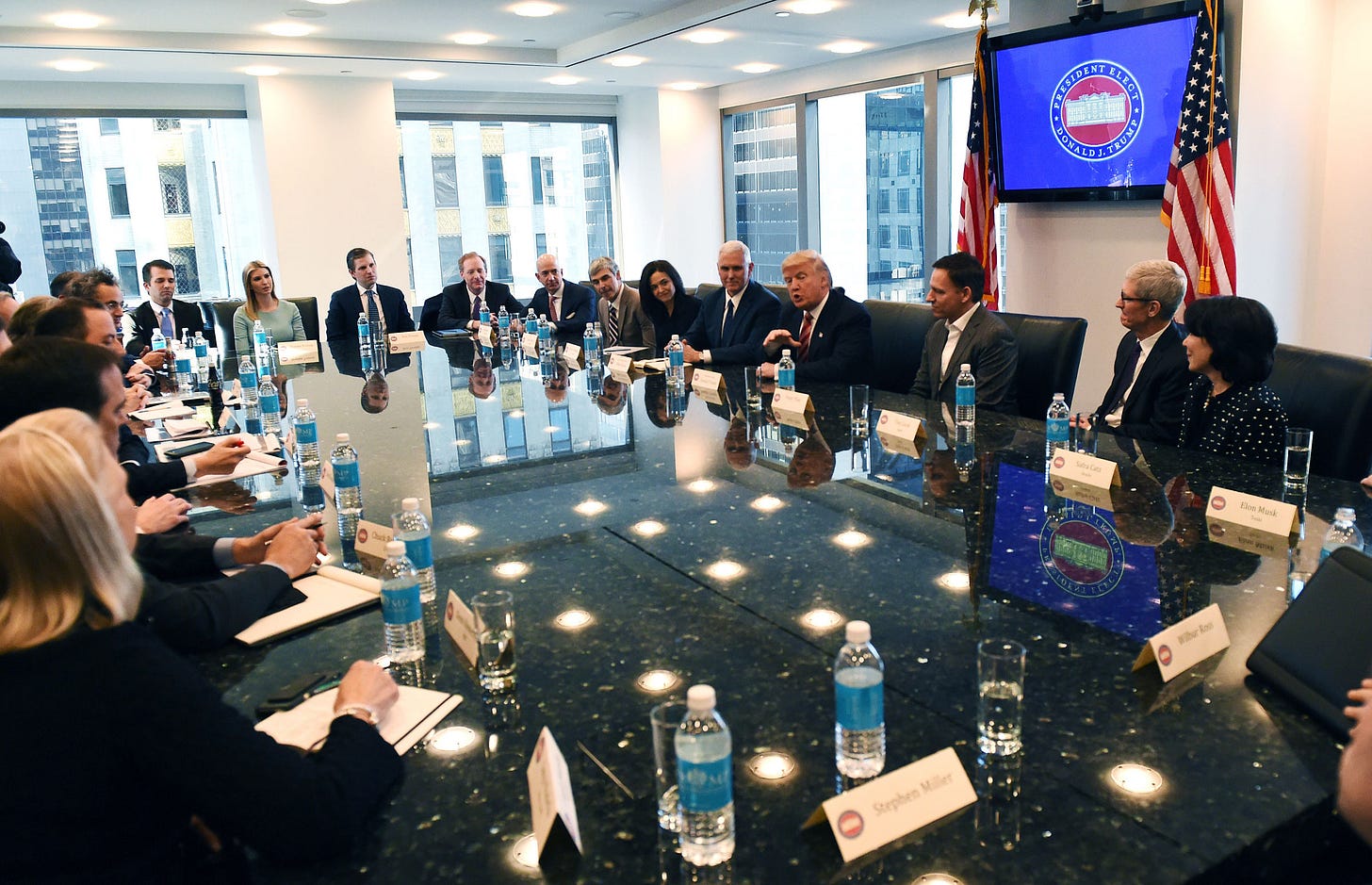The Silicon Oligarchy
This doesn't bode well.
Hi. Can here. Today, we talk about Trump and the US tech oligarchy.

BY SAMUEL CORUM/GETTY IMAGES.
Ranjan and I like to pontificate on grand unifying theories here. It is fun, as an armchair analyst with no skin in the game, to come up with a pet theory and try to shoehorn every phenomenon into it. The notion of a “theory of everything” comes from physics, where people have been trying to find a theory that explains all four major forces, but it’s been beaten to death by people in all walks of thought. Ranjan, for example, believes that ZIRP is responsible for many of the tech foibles. I think data-as-a-liability is going to be a big reckoning, so much so that I bet my career on it.
The theories are hardly the point, and most of the time they are more conversation starters than anything. Most of the time, they reveal more about the person who came up with the theory than having any predictive power. Still, they are fun. And so, we keep coming up with them.
Here’s a brief bio: I am Turkish. I grew up in Turkey and only came to the US for college in 2006. It is one reason my pieces generally have more grammatical mishaps, but also why I sometimes look at the world a bit differently than most people here in the US, and especially Silicon Valley. It’s this troubled but colorful past that informs and taints most of my thinking.
One of my new grand theories is that America lags 5-7 years behind emerging markets when it comes to the impact of American companies on society. And now, whatever heaven and hell tech companies have wrought upon the emerging markets is now on our doorstep. I know people say this in the context of mobile payments and the like, but I think that really underplays what’s actually happening here. I am more concerned about the social and political implications of what’s happening here. I am worried as the Silicon Oligarchy we have built is embedding itself deeper into the American institutions and we are all soon going to pay for it dearly.
One of the things I’ve noticed over the years is how America has been slowly turning into a Small Turkey [1], especially with the Trump administration going off the rails. The similarities were there for years, from vilifying the press to Trump’s general authoritarian tendencies, but recently things have become even darker.
As the Black Lives Matter demonstrations gained momentum and the police response became increasingly violent, I found myself reliving what Turkey has gone through, but in English. I’ve seen a few tweets that make the joke about how this issue would have been reported in the US. You know the headlines I’m talking about; the ones that read like: “Former British colony in disarray as security forces backed by the state use force against protests, racial tensions run high.” The deferential neoliberal voice surely sounds different when the subject is yourself.
One of the defining qualities of authoritarianism in the modern era is oligarchs. The primary example here is, of course, the Russian Federation, and more specifically the Putin administration. Turkey, however, is no different. The primary way Erdogan administration has hollowed out the Turkish state and established a new regime was through the cooperation of big business. Erdogan has turned many of the centrists business into its allies, and wherever it couldn’t it replaced the leaders altogether. While the Turkish administration did use a heavy hand at times with tax levies and jail time, most of it happened voluntarily, and with full cooperation. There were also a few industries, such as construction, that were spun up to a create new set partisan oligarch class.
It was through this combination of former-critics-turned allies, and new supportive leaders, for example, Erdogan was able to take full control of the media. The companies are private and independent on paper, but they take orders from the government as most of their revenues come from government contracts from other industries. [2]
Observing from this vantage point, it has been hard for me not to cringe at how co-operative many of the Silicon Valley executives have been with the Trump administration, and especially Donald Trump himself. I recognize that Trump is an elected official, and thus represents the people’s will, but it is still hard to stomach so many of the businesses not just following the law, but also falling in line. This is the kind of stuff that gives me actual nightmares and wonder if America has any future left.
I’ve mulled on writing this for a while, and it wasn’t until I read Rana Foroohar’s FT piece, Facebook and the creation of a US oligarch, and Ranjan always asking me where on the “Erdogan spectrum” the U.S. currently is, that things fell into place. This is why Zuckerberg’s recently found affinity for Trump has bothered me so much. When Trump posted violence-inciting statements on both Twitter and Facebook, we saw both the inner workings of two companies come to surface.
While Jack Dorsey tried to distance itself from the posts, Mark Zuckerberg leaned on them. He even went against the wishes of many of his previously loyal-to-a-fault employees. To me, it reeked of the actions of an oligarch who could not risk losing their symbiotic relationship with the most powerful executive in the world.
It is tempting, in some ways, to intellectualize what Facebook has done with misguided references to freedom of speech as if that’s a real thing that Facebook is or should be concerned about.
Surely, if we are afraid of Facebook limiting freedom of speech by merely minimizing the reach of the world’s most well-covered person, we should already be thinking of ways to eliminate this bottleneck. But that’s not even the point. Facebook executives shared in perverse glee the power of their platform, and how it elected Trump before. They will never hand over the reins.
Zuckerberg and the entire Facebook management has turned coming up with empty talking points into a science. Zuckerberg’s actions have never been about building a new community, or establishing a new fifth estate, or even connecting people. The through-line that connects the dots has always been amassing more power. It is why the company tries so hard to embed itself more into our lives, and also our most fundamental institutions, including the American presidency.
This is why Trump gets a personal phone call, even though he is a side in the debate. It’s also why an American presidential candidate is an existential threat to be wrestled with while a Chinese president gets first dibs on naming Zuckerberg’s kids. This is why Marc Andressen, a Facebook board member, gets chided after reminiscing of British colonization of India exactly when Facebook is trying to enter the country and Peter Thiel, another Facebook board member who openly ponders the impact on women’s suffrage on his freedoms, takes Zuckerberg on a secret dinner with Trump. The goal has always been to accumulate and retain power.
The real frustrating thing for me is that none of this was inevitable. Trump has ridden a wild birther conspiracy theory into the presidency, so of course, he’s now going to believe (or at least use) a new one about a 75-year old injuring himself to own the libs. Of course, Trump did not want immigrants, so he’s going to do his best to build a wall and now cut down on immigration. I went on record with Bloomberg when Trump got elected that as an immigrant:
Silicon Valley is still the best place in the world to work in tech, but things aren’t the same, says Can Duruk, a Turkish software engineer for Uber. He just got his green card after six years on an H-1B visa. But he’s still worried about the possibilities for immigrants in the U.S. “This country has elected someone who was more or less openly racist at points,” Duruk says, comparing Trump’s attitude and rise to the repressive Turkish President Recep Tayyip Erdogan. “It feels like a punch in the stomach.”
I felt unsafe, and as a Turkish immigrant, I felt like I am reliving my past horrors in my adopted home. It felt like a punch in 2016, and almost four years later, I feel worse about it than I did before.
I wish that the Silicon Valley executives could have seen this as well, and not just become peons for this administration. I have no hope for Facebook, but maybe the rest can do better.

Notes
1: I use the phrase “Small Turkey” in quotes because it’s especially ironic to me. A few decades ago, a Turkish president once said he wanted to turn Turkey into a “Small America”, a land of opportunity and wealth, where anything is possible. How the tables have turned!
2: You could argue this is a hole in my argument. After all, (social) media companies like Facebook are more than self-sufficient. My point is that the companies’ revenues are decoupled from their impact on society. In Turkey, this decoupling happens through conglomerates that have subsidiaries in different industries that sustain each other. In the US, it is the monopoly position, as well as the intentionally addictive nature of social media, that gives the companies ability to wreak havoc without worrying about the consequences.
Frontline Foods
A couple of weeks ago, we had an extremely popular piece that garnered us quite a bit of attention. We wanted to convert some of those pageviews into donations to Frontline Foods and promised to publicize people who did. I am sorry this took much longer. If any consolation, since that we have added several thousand more readers so maybe it’s not all bad.
We wanted to openly thank everyone who has donated, and wanted to give them some shout outs:
User Interviews, a service that allows you to get quick product feedback,
World Politics Review, a source for in-depth news and expert analysis on global affairs,
Clockwise, a quick and easy to way to own your calendar and not be distracted,
Madison Capital, an early-stage seed fund in India,
Kidappolis, an app for kids to use their screen time for learning,
Net Interest, a new newsletter about the financial sector and fintech from a former analyst
Betasso, a small software company that can help with custom development needs.
Thank you for being such gracious and kind readers.


I wholeheartedly agree with your sentiment but what can be done to stop our slide towards authoritarianism? The entire system is so deeply rooted in supporting the powers that be I just don't see a way we can overcome them. This is not a democrat or republican issue, they are both supporting the same power structure. What do you suggest we do?
Really enjoyed this. I strongly disagree with many of the points, but respect the way you present the argument. Big fan of the newsletter.